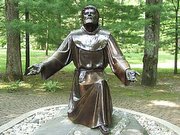“The “displaced” want to be “placed” again
 Driving from Lusaka in Zambia down to the amazing Kariba Dam used to be a journey of contrasts. Flat, dry savannah where goats roamed searching for the non-existent grass of Zambia’s Southern Province made way for hills, sometimes steep, through which the road wound in steep curves and traffic jams behind stalled and slow-moving, heavily-laden trucks of goods bound for Zimbabwe and South Africa. Potholes and frequent stretches of gravel roads gave way, at Kariba, to excellent tarmac and the impression of silky-smooth roads; such was the contrast...at least, that is, before the increased hardships of the past ten years. Now, the Zambian roads surpass those of Zimbabwe, because where there is no money for food, road maintenance becomes an insignificant priority.
Driving from Lusaka in Zambia down to the amazing Kariba Dam used to be a journey of contrasts. Flat, dry savannah where goats roamed searching for the non-existent grass of Zambia’s Southern Province made way for hills, sometimes steep, through which the road wound in steep curves and traffic jams behind stalled and slow-moving, heavily-laden trucks of goods bound for Zimbabwe and South Africa. Potholes and frequent stretches of gravel roads gave way, at Kariba, to excellent tarmac and the impression of silky-smooth roads; such was the contrast...at least, that is, before the increased hardships of the past ten years. Now, the Zambian roads surpass those of Zimbabwe, because where there is no money for food, road maintenance becomes an insignificant priority.
However, the roads of Zimbabwe told their own story. A wide grass verge and high wire fences did more than merely keep wild animals away from the road: often, they told stories of the struggle for independence during the apartheid era, when the Government’s antagonists were described as ‘guerrillas’ or ‘freedom fighters’ depending on one’s point of view. There were occasional discoveries of mass graves, many of them hastily covered over and their finders sworn to silence.
More positively, from time to time, amidst the tall grass, there is still evidence of the ‘strip road’, two parallel tracks of tarmac, just sufficiently far apart as to permit a small pick-up, a tractor or a lorry to drive through the bush. Yet a basic road, in itself, is only a small help to peasant farmers, who, even today, depend on a donkey, a hand-held plough, hoes and relatives in order to cultivate poorly-irrigated land which is continually raided by birds, baboons and, sadly, by other hungry people.
For huge numbers of villages in Zimbabwe, their occupants are totally dependent on seasonal rivers where they dig ever-deeper holes in the river bed in an attempt to find water for themselves and their animals. Water is such an incredibly precious commodity in the seemingly endless years of drought that it is ‘normal’ to see, in a small waterhole, a woman filling her pots with water to carry home whilst using the same pool to bath her children and wash the family’s clothes whilst, a couple of yards away, sheep and goats slake their thirst ... and, of course, water means snakes and, during the rainy season, crocodiles, which regularly claim their victims.
A few minutes ago, I received the following from a friend in Zimbabwe, whose name I withhold:
“This morning two women came to our parish house seeking help, rural women from a village about 70 km out of town. They have been homeless and living rough since April. That is when they were severely beaten up for having voted “wrongly” and had their houses burnt down. They showed me their scars. The elder has not seen her husband and children since then, does not know where they are, and indeed if they are still alive.
For a time they stayed at Harvest House where the police were harassing them, took them to Ruwa, evicted them….They look and smell like street people, have not had a wash for days. They know it and are embarrassed.
Now they want to go home, to see if their families are still there, to resume their old lives if at all possible. But it will not be possible, life never be the same again. These scars and the memories of these last few months cannot be erased. Some human relationships may have been broken once and for all: most victims, I have found, know at least some of their assailants. How can you ever chat casually again and laugh with a neighbour who screamed for your blood?
Some of those who come for help will not take a NO for an answer. They know what they want and they want it NOW! No good explaining that it may take a day or two to get them the help they need. Cash is scarce and hard to come by. Food runs out very quickly, the demand is so high. The helpers and volunteers are only human and can take just so much. Tension rises quickly and nerves are frayed, soon something snaps, and there is an ugly scene. You wanted to be kind and you feel awful you were not….
You had better not read the papers. Do the people who so desperately hang on to power have the slightest idea of all the suffering they have caused, are still causing? Do they care? They have even the cheek to demand amnesty and impunity for the terrible things they have done to this ragged, dishevelled, dirty bit of humanity that lines up at our doorsteps. Better not think about those people too much while you are trying to sort out the mess they are responsible for. Your blood may just boil over.
And yet you wanted to be so kind……”
God bless, and may God also bless the people of Zimbabwe,
Sr Janet

